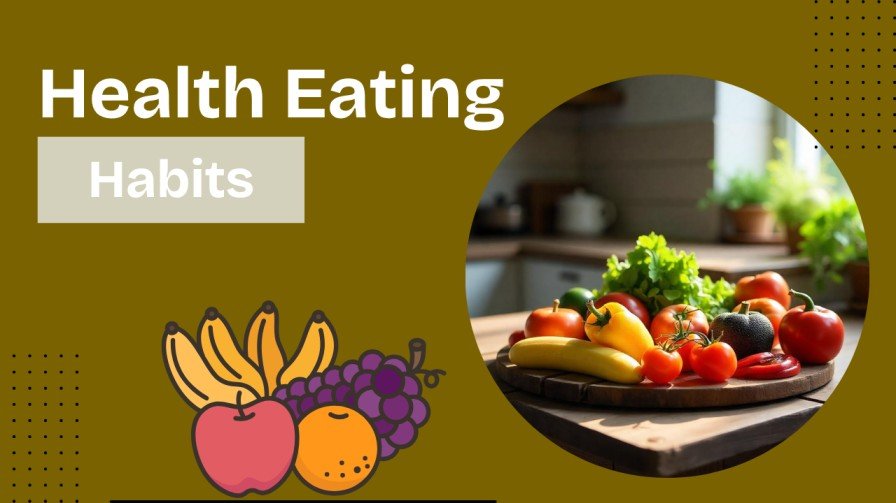Healthy Eating Habits: A Path to a Better Life

Healthy Eating Habits
In today’s fast-paced world, where convenience often takes priority over health, maintaining healthy eating habits has become more important than ever. A balanced diet not only fuels the body but also helps prevent chronic illnesses, boosts mental well-being, and enhances overall quality of life. Developing healthy eating habits is not about strict dietary limitations or depriving yourself of the foods you love. Instead, it’s about feeling great, having more energy, improving health, and stabilizing your mood.
Understanding Healthy Eating
Healthy eating is about consuming a variety of foods that provide the nutrients your body needs to maintain health, feel good, and have energy. These nutrients include protein, carbohydrates, fat, water, vitamins, and minerals. The key to healthy eating is balance, moderation, and variety.
Unfortunately, with the growing availability of processed foods, sugary snacks, and fast food, people often struggle to make the right food choices. Poor eating habits such as overeating, skipping meals, and consuming excessive amounts of sugar, salt, and unhealthy fats can lead to obesity, heart disease, diabetes, and other health problems.
Key Components of Healthy Eating Habits
1. Eat Plenty of Fruits and Vegetables
Fruits and vegetables are rich in vitamins, minerals, fiber, and antioxidants. They help reduce the risk of chronic diseases such as heart disease, stroke, and certain types of cancer. Aim to fill half your plate with fruits and vegetables at every meal. Choose a variety of colors and types to ensure a diverse intake of nutrients.
2. Choose Whole Grains
Whole grains like brown rice, whole wheat bread, oats, and quinoa are excellent sources of fiber, which promotes healthy digestion and keeps you feeling full longer. They also help regulate blood sugar levels and lower cholesterol.
3. Include Lean Proteins
Protein is essential for building and repairing body tissues. Opt for lean protein sources such as fish, skinless poultry, beans, lentils, tofu, eggs, and low-fat dairy. Fish like salmon and mackerel are also rich in omega-3 fatty acids, which are beneficial for heart health.
4. Limit Processed and Sugary Foods
Highly processed foods and sugary drinks provide little nutritional value and are often high in calories, unhealthy fats, sugar, and salt. These foods can contribute to weight gain, diabetes, and other health issues. Instead, choose natural, whole foods whenever possible.
5. Stay Hydrated
Drinking enough water is crucial for overall health. Water helps regulate body temperature, transport nutrients, and remove waste products. Aim to drink at least 6-8 glasses of water a day. Limit sugary drinks, energy drinks, and excessive caffeine intake.
6. Practice Mindful Eating
Mindful eating involves paying full attention to the experience of eating and drinking. It helps you recognize hunger and fullness cues, prevents overeating, and increases enjoyment of food. Avoid eating in front of the TV or computer and take time to chew your food properly.
Tips to Develop Healthy Eating Habits
- Plan Your Meals: Planning meals in advance helps ensure balanced, nutritious options and reduces the temptation to reach for unhealthy snacks or fast food.
- Control Portion Sizes: Eating large portions, even of healthy foods, can contribute to weight gain. Use smaller plates and be mindful of portion sizes.
- Don’t Skip Breakfast: A nutritious breakfast jumpstarts your metabolism and provides energy for the day. Include protein, whole grains, and fruits for a balanced meal.
- Snack Wisely: Choose healthy snacks like nuts, yogurt, fruit, or vegetables instead of chips or candy.
- Be Realistic: You don’t have to change your diet overnight. Start with small, gradual changes and build on them over time.
Conclusion
Healthy eating is a lifelong commitment that can lead to numerous benefits, including increased energy, improved mood, better weight management, and a reduced risk of chronic diseases. By making small, consistent changes to your eating habits, you can improve your health and well-being. Remember, it’s not about perfection but about making better choices more often. Your body will thank you for it.






